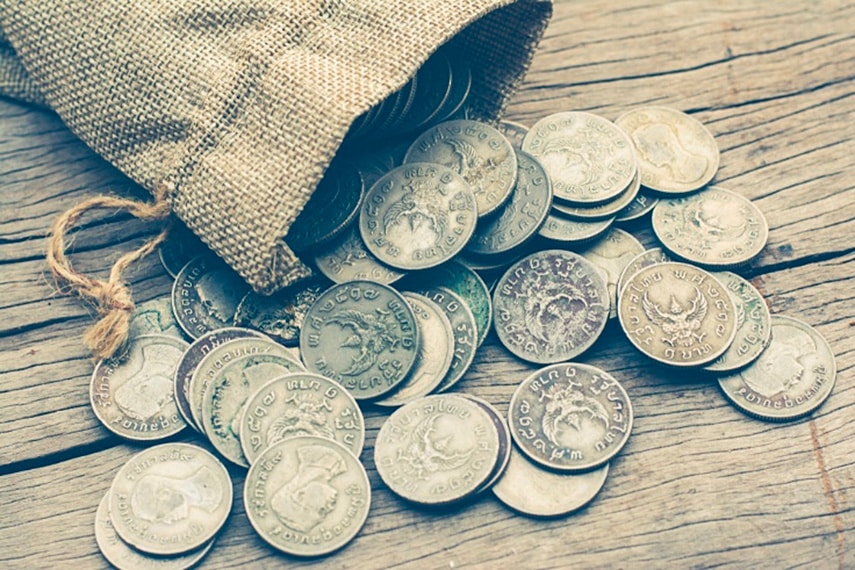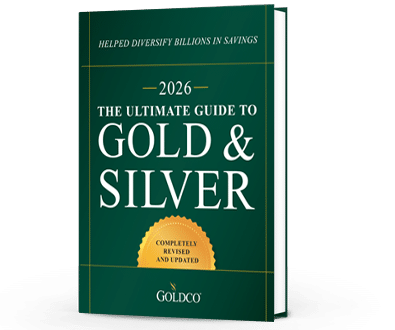How to Buy Physical Gold
A 65% increase in the gold price last year has helped drive a surge in interest in buying gold as a safe haven asset Options for buying physical gold including gold coins, gold bars, gold...
Precious Metals

For centuries silver, not gold, was the precious metal of ordinary commerce. Numerous currencies, from the mark to the pound to the dollar, were defined as weights of silver.
From Europe to China to the New World, silver coins were the currency of choice. Silver defined what it was to be cold, hard cash.
That continuous demand over centuries hasn’t abated, as many people today trust silver just as much as gold to help protect their wealth when they really need to. Unlike the dollar, which has grown ever more devalued over time, silver tends to maintain its value over time, making it a central part of many people’s portfolios.
Silver is in constant demand from markets, jewelers, and industry. With rising industrial use for silver, particularly for solar energy, and with silver demand often outstripping silver supply, the long-term outlook for the silver price remains bullish.
Many analysts have become much more bullish about silver too. And silver exchange-traded funds are big buyers too, continuing to increase their holdings of silver.
By buying silver, you can help diversify your portfolio and hedge against the risk of financial turmoil and inflation. And with a silver IRA you can own silver while still enjoying all the same tax advantages as a traditional IRA.
The more you learn about silver and owning silver through a silver IRA, the more you’ll realize the reasons silver can be such a valued asset.
Unlike paper assets such as stocks and bonds, silver is an actual asset, a store of value. Stocks are a claim to ownership in a company, but if the company fails then your “asset” is worthless.
It’s the same with bonds – if the company issuing the bonds goes out of business then you’ll be lucky to get pennies of your principal back.
Silver, on the other hand, is one of the world’s most widely traded commodities. It’s in demand around the world, on commodities exchanges, at coin shops, and online.
Just like gold, silver can help protect retirement portfolios against inflation and help maintain value during financial downturns. With a track record dating back thousands of years, it’s no wonder that people continue to trust silver to help safeguard their wealth.
To answer whether silver is a good choice or not, we must look at some of the advantages that can come from owning precious metals like silver.
Silver can help protect your assets both in the long term and the short term. While many people hold onto silver for years or decades to help safeguard their portfolios, silver’s performance during times of financial stress has made it a popular asset in recent years.
Whereas markets lost well over 50% of their value during the 2008 financial crisis and took over five years to regain their pre-crisis levels, silver held most of its value. In the years after the financial crisis, silver more than quintupled in price.
Just like gold, silver has a reputation for increasing in price as markets begin to perform poorly. When markets are expected to decline, silver can be one possible choice to act as a hedge.
Another important characteristic of silver is that it is tangible. That in and of itself provides a useful benefit. As the old saying goes, a bird in the hand is worth two in the bush.
Stocks can rise and fall in value as economic conditions fluctuate, and bonds can fall in price very quickly as the financial positions of their issuers deteriorate. There’s no guarantee that the company issuing stocks or bonds will even exist in the event of a severe economic downturn.
With silver, on the other hand, you’ll always have that physical metal to turn to. When times get tough, having that physical metal in your hands can provide you much-needed peace of mind.
Silver is often referred to as “poor man’s gold.” Its much lower price enables those who aren’t of great means to get their feet wet owning precious metals.
Whereas $50,000 will get you a roll of gold coins that will fit in the palm of your hand, that same sum will buy you enough silver to fill a backpack.
That can make it a little more difficult to store or transport, but it can make it easier to sell off in small quantities too. While you can buy smaller gold coins in weights down to 1/10 or 1/25 of an ounce, the premiums you’ll pay can sometimes be higher.
That makes silver the obvious choice for those who want the flexibility to buy or sell in smaller increments than they would have to if owning gold. And if you choose to buy silver through a silver IRA, there are numerous IRA-approved silver coins from which you can choose.
Because demand for silver is influenced to a greater degree by industry than demand for gold, silver can offer higher returns than gold. A boost in silver demand can lead to price increases that, percentagewise, are greater than those of gold.
A $30 increase in the gold price is a good gain, but a $1 increase in silver’s price is significantly higher percentagewise.
That’s not an uncommon occurrence either, as during bull markets silver’s gains can outpace those of gold. While gold may get the headlines and the attention, some people know that silver can be just as important a metal to buy as gold.
Silver has a strong tradition of helping maintain wealth stability. Because it was used for so many years as currency, many Americans today still remember the days of using silver coins. That continued familiarity works to silver’s favor.
Silver also maintains its value against paper assets such as stocks, bonds, and even the dollar. Whereas the value of the silver in a silver dollar used to be a dollar, today its silver content is worth over $25. Compare that to a paper dollar, which has lost 88% of its value since 1971.
Silver also has some cash-like benefits because you can purchase it nearly anonymously. While large cash purchases and large sales may trigger reporting requirements to the IRS, some people may choose to acquire their silver coin-by-coin.
No analysis of silver would be complete without listing and discussing its disadvantages too. Like any asset, owning silver is best suited to people for whom it can offer the right performance.
Whether silver is a good asset choice for you depends on your current situation, your goals, and your roadmap for the future.
The primary disadvantage of owning silver is its potential price volatility. While silver can present a significant upside when it’s growing in price, it can just as easily drop in price when market conditions favor a price decline.
Part of that is due to silver’s heavy use as an industrial commodity. While industrial demand is generally steady, during times of rapid and severe economic slowdowns or contractions, the silver price can drop suddenly without warning.
We witnessed that in early 2020 with the COVID-19 lockdowns: as industrial activity ground to a halt, industrial silver demand dropped, and the silver price fell as a result. While the silver price has risen over 230% since then, that price volatility always remains a possibility.
While silver may be beautiful, it’s also bulky. $50,000 in gold coins can fit in the pocket of your pants, but $50,000 in silver would need a large cardboard box or backpack and would be quite heavy. For many people, that means it’s more practical to buy gold in order to minimize bulk.
Because of silver’s greater bulk, it takes up more space in storage, too. If you’re storing your silver at a location that charges based on the amount of space you use, that could mean that your silver assets end up costing you more in storage fees than an equivalent dollar amount of gold.
As with any tangible asset, there’s always a risk of theft. But that risk can be mitigated by choosing storage options to minimize that risk.
Depending on how you buy silver and where you store it, the risk of theft can range from highly likely to quite minimal. Buying silver coins and storing them at home may be the riskiest option, exposing you not only to theft but also to fire, natural disaster, or even forgetfulness.
Safe deposit boxes could be a safer option, as could storing your silver coins with a bullion depositor, which you would have to do if you purchase silver coins or silver bars through a silver IRA.
Like any other asset, owning silver carries with it some risk. There’s always the potential for your silver assets to lose value, just as with any other asset.
Overall, however, there’s a reason so many people choose to buy silver. Despite the risks, the risk profile of silver differs from that of many other conventional financial instruments.
For one thing, the fact that so many people flock to silver during times of economic turmoil marks silver as a safe haven asset. That silver tends to perform well when markets are underperforming is another advantage to owning silver.
At the end of the day, however, it’s your decision as to whether owning silver raises or lowers the risk profile of your assets.
While silver can be a great asset to own, the timing of buying silver can make a big difference in the returns you make and, consequently, can determine whether buying silver is right for you. Knowing whether silver is the right choice for you means looking at your current situation and your future plans.
Depending on how long you plan to own silver, and how diversified (or not) your portfolio is, silver could be a good choice for you not only to make possible gains, but also to diversify and de-risk your assets. This is something you may want to discuss with your financial advisor, to see how owning silver might fit in with your retirement planning.
If you’re interested in learning more about the advantages of silver, and the potential benefits that come with starting a silver IRA, now is the time to do it. With a silver IRA you can use pre-existing retirement assets from a 401(k), 403(b), TSP, IRA, or similar retirement account to purchase silver coins or silver bars while still maintaining all the same tax advantages as any other IRA account.
Goldco has helped thousands of customers benefit from owning precious metals. With over $3 billion in precious metals placements and over 7,000 5-star reviews from our satisfied customers, we have worked hard to become one of the best gold and silver companies in the country.
Don’t wait any longer to take advantage of putting silver to work for you. Call Goldco today to learn more about how silver can be a good choice to help you achieve your goals.
This article was originally published in October 2020 and was updated in May 2025.

